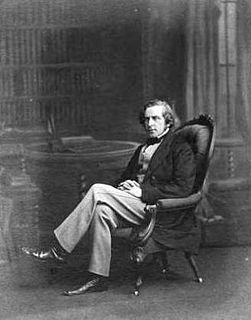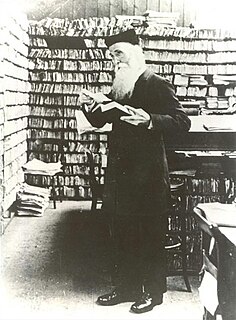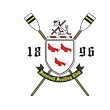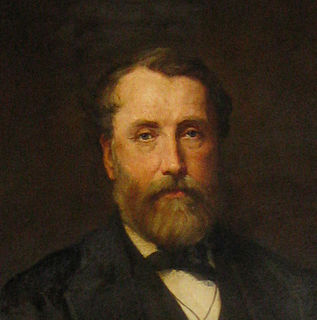Life
He was the youngest son of Major Francis William Stanford of the 1st Life Guards, from County Mayo, and his second [3] wife Mary, daughter of William Gorton. [2] [4] He was half-brother to Sir Robert Stanford (1806–1877). He was educated at Eton College, and was admitted a pensioner of Trinity College, Cambridge in 1832. He did not reside there, and was admitted to Christ's College in 1834, matriculating in 1834, and graduating B.A. in 1838, M.A. in 1842. [2]
Stanford was admitted to Lincoln's Inn in 1841, was called to the bar in 1844, and that year became a Fellow of the Royal Society. He was elected Member of Parliament for Reading in 1849, serving until 1852. [2] He belonged to the Conservatives.
Legacy
Stanford left £5,000 to the University of Cambridge which went to support the creation of a dictionary of anglicised words which was finally published as Charles Fennell's Stanford Dictionary of Anglicised Words and Phrases. [5] The project was intended to complete his own Etymological Dictionary dealing with words and phrases from other languages adopted in English, a work that had consumed Stanford in the final years of his life. [6] Stanford had struggled to find a home for the project: it had been rejected by the Philological Society in the 1870s [7] and, when it was offered to Cambridge, Edward Byles Cowell, Walter Skeat and Aldis Wright all considered that the bequest should be rejected, but they were not in the majority when it came to a vote. [8]
He also left £25,000 to St Mary's Hospital in Paddington and £5,000 to the Royal National Lifeboat Institution, for a boat named after his mother Mary. [9] There have been two such boats, RNLB Mary Stanford (ON 661) and RNLB Mary Stanford (ON 733).
Frederick Apthorp Paley, was an English classical scholar.

Richard Chenevix Trench was an Anglican archbishop and poet.

William Thomson, was an English church leader, Archbishop of York from 1862 until his death.

James Orchard Halliwell-Phillipps was an English Shakespearean scholar, antiquarian, and a collector of English nursery rhymes and fairy tales.

Thomas Hughes was an English lawyer, judge, politician and author. He is most famous for his novel Tom Brown's School Days (1857), a semi-autobiographical work set at Rugby School, which Hughes had attended. It had a lesser-known sequel, Tom Brown at Oxford (1861).

Sir James Augustus Henry Murray, FBA was a Scottish lexicographer and philologist. He was the primary editor of the Oxford English Dictionary (OED) from 1879 until his death.
Robert William Burchfield CNZM, CBE was a lexicographer, scholar, and writer, who edited the Oxford English Dictionary for thirty years to 1986, and was chief editor from 1971.
The Imperial Dictionary of the English Language: A Complete Encyclopedic Lexicon, Literary, Scientific, and Technological, edited by Rev. John Ogilvie (1797–1867), was an expansion of the 1841 second edition of Noah Webster's American Dictionary. It was published by W. G. Blackie and Co. of Scotland, 1847–1850 in two large volumes.
John Ogilvie was a Scottish lexicographer who edited the Imperial Dictionary of the English Language.

Furnivall Sculling Club is a rowing club based on the Tideway in Hammersmith, London. It was for a time called Hammersmith Sculling Club. It was founded in 1896 by Frederick Furnivall, after whom the riverside Furnivall Gardens a few metres away are named. For its initial five years, in the reign of Queen Victoria, the club was for females only and is widely considered to have had the world's first female rowing team (crew). Furnivall has also admitted males since 1901. The club colours are a precise pallette: myrtle and old gold.

Mark Firth was an English industrialist and philanthropist.
Chapman & Hall is an imprint owned by CRC Press, originally founded as a British publishing house in London in the first half of the 19th century by Edward Chapman and William Hall. Chapman & Hall were publishers for Charles Dickens, Thomas Carlyle, William Thackeray, Elizabeth Barrett Browning, Anthony Trollope, Eadweard Muybridge and Evelyn Waugh.
John Worthington (1618–1671) was an English academic. He was closely associated with the Cambridge Platonists. He did not in fact publish in the field of philosophy, and is now known mainly as a well-connected diarist.

John Alexander Fuller Maitland was an influential British music critic and scholar from the 1880s to the 1920s. He encouraged the rediscovery of English music of the 16th and 17th centuries, particularly Henry Purcell's music and English virginal music. He also propounded the notion of an English Musical Renaissance in the second half of the 19th century, particularly praising Charles Villiers Stanford and Hubert Parry.

Alcott House in Ham, Surrey, was the home of a utopian spiritual community and progressive school which lasted from 1838 to 1848. Supporters of Alcott House, or the Concordium, were a key group involved in the formation of the Vegetarian Society in 1847.
Frederick Thrupp (1812–1895) was an English sculptor.
George Williams (1814–1878) was an English cleric, academic and antiquary.
Albert Micajah Shipp (1819-1887) was an American Methodist minister and university administrator.
Sarah Lawrence (1780–1859) was an English educator, writer and literary editor. She ran a girls' school in Gateacre near Liverpool, and was a family friend of the Aikins of Warrington, and an associate of members of the Roscoe circle.
This page is based on this
Wikipedia article Text is available under the
CC BY-SA 4.0 license; additional terms may apply.
Images, videos and audio are available under their respective licenses.








